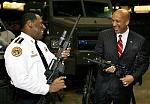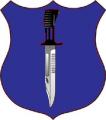Just like a sports team, combat units preform better when the personnel have trained, fought, and lived together for long periods of time. What if the Army assigned people to the same unit for a soldiers' whole career? Obviously it wouldn't be perfect, as it wouldn't be possible to stay in the same company for 20 years but how about the same brigade/UOA? Besides combat effectiveness, this would make life on the family much easier.
Now, a couple issues do come up. First, what to do about Germany and Korea? I'm pretty sure no one would want to stay in Korea for 20 years. Next, is there a possibility of cliques forming? Last, could this even work structurally? In other words, isn't there a need to move people around to fill slots?
I even like the idea of regional assignments. I believe the British have this system, but I'm not sure? The soldier would be stationed at the post nearest to his/her hometown for his/her whole career. This may not be possible in the US, but I thought I'd throw this in as well. I sort of like the idea of looking on the wall of the Brigade museum and finding your grandfather or father's picture.
So, what do ya think? Good idea? Bad idea? Not possible?













Bookmarks